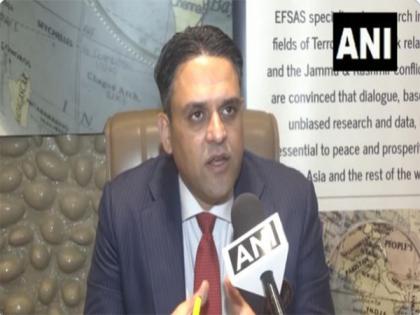"India is the legal owner of JK, needs to build its own narrative": EFSAS Director Junaid Qureshi
By ANI | Updated: September 4, 2025 09:10 IST2025-09-04T09:08:31+5:302025-09-04T09:10:18+5:30
Srinagar (Jammu and Kashmir) [India], September 4 : The European Foundation for South Asian Studies (EFSAS) has commenced operations ...

"India is the legal owner of JK, needs to build its own narrative": EFSAS Director Junaid Qureshi
Srinagar (Jammu and Kashmir) [India], September 4 : The European Foundation for South Asian Studies (EFSAS) has commenced operations in Srinagar, with its Director Junaid Qureshi outlining the think tank's focus on terrorism, Indo-Pak relations, and Jammu and Kashmir.
He further stressed the importance of building a national narrative, stating, "India is the legal owner of J&K and needs to build its own narrative."
Speaking on the institute's work, Qureshi said, "Our think tank has been working on terrorism for the last 12 years, especially Indo-Pak relations and J&K...Since Kashmir has been a victim of terrorism, I wanted to do research on it." He added that there needs to be "foundational evidence and data-based research" and emphasised the importance of bringing the youth on board.
Addressing the challenges faced by young people, Qureshi remarked, "The youth today are confused. It needs to know certain things." His comments came against the backdrop of his consistent interventions on terrorism and regional security.
In this context, Qureshi had also strongly criticised the alleged nuclear threat made by Pakistan's Army Chief General Asim Munir during a visit to the United States, calling it "foolish" and "irresponsible."
In an exclusive interview with ANI, he said that if the reported statementssuggesting Pakistan could "wipe out half of the world"were true, they reflected a dangerous level of recklessness in the country's military leadership. "I consider it a very irresponsible remark," Qureshi stated. "By threatening half of the world, he is doing a great disservice to Pakistan."
He emphasised that such declarations also exceeded the constitutional authority of Pakistan's military leaders, pointing out that, at least theoretically, the power to authorise the use of nuclear weapons rests with the civilian government. "The general will not determine when to deploy nuclear weapons; that is a decision for the civilian administration," he elaborated.
Turning to Pakistan's relationship with the United States, Qureshi argued that recent diplomatic goodwill towards Islamabad was more about US strategic interests than about India-Pakistan relations, particularly in the context of Iran and China. "Historically, Pakistan has functioned as a proxy for the US within this area," he claimed, adding that Washington may be seeking to use Pakistan to counterbalance Iran while weakening its close ties with China.
He also accused Pakistan of fostering extremism, stating, "Pakistan has been involved in supporting terrorism internationally. There is no question about that." Qureshi cited acknowledgements from Pakistani officials, including Bilawal Bhutto Zardari, about Islamabad's role since the Afghan strugglefirst on behalf of the West and later as part of its "strategic depth" policy against India and Afghanistan.
According to him, Islamabad has long played a "double game," taking US aid while simultaneously funding terrorist groups for its strategic aims and fighting them when they turned against the state. "The West has been aware of this situation for a long time," he noted, "but it has maintained a close relationship with Pakistan because it aligns with their regional interests."
Warning of the consequences of this renewed engagement, Qureshi cautioned that Pakistan might feel emboldened to escalate terrorism in Jammu and Kashmir. He linked potential unrest to broader geopolitical strategies, suggesting that China benefits by keeping India distracted militarily and politically in Kashmir while tensions persist on the eastern front.
As evidence, he cited the recent terrorist attack in Pahalgamthe first such major incident in yearswhich he said was linked to Pakistan and intended to undermine Kashmir's peace and economy. "Tourism is declining, terrorism is on the rise, and the Kashmiris ultimately bear the consequences," Qureshi expressed regretfully.
He underlined that ordinary Kashmiris should not be blamed for this violence, which he described as "imported from elsewhere" and orchestrated by Pakistan. "Mr Modi's initiative of boosting tourism while reducing terrorism has been jeopardised by these attacks," he remarked, pointing to the increase in targeted killings and assaults on non-Muslims in the region.
On the broader Kashmir issue, Qureshi reiterated that Pakistan would continue to push for third-party mediation, particularly from the US. However, he argued that such efforts are unlikely to succeed without India's consent. While predicting intensified lobbying and advocacy on Kashmir in Western circles, he maintained that enforceable mediation remains improbable due to India's longstanding opposition.
Disclaimer: This post has been auto-published from an agency feed without any modifications to the text and has not been reviewed by an editor
Open in app